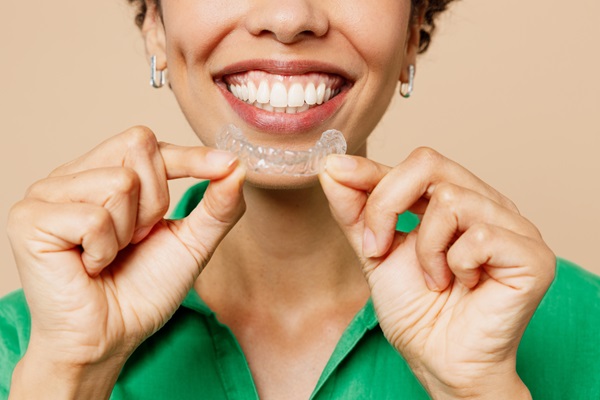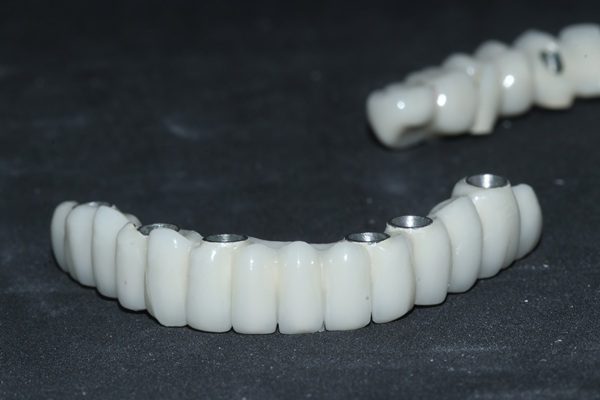Oral Hygiene Information During Invisalign Therapy from a General Dentist

The popularity of Invisalign® has grown as the treatment has proven to produce successful and positive results. Additionally, the treatment process is unlike any other. The actual process is a lot simpler than traditional approaches, and there are benefits that come with Invisalign® too.
One more important part of Invisalign® treatment is the need to remain disciplined with wearing the actual aligners. Because Invisalign® is removable, wearers are encouraged to keep the actual piece in for 22 hours a day. The only time the aligners should be removed is to eat and for oral hygiene. Keep reading to find out more.
Oral hygiene during Invisalign® treatment
Below is a quick overview of what one's oral hygiene routine should look like during the Invisalign® treatment process. This information may be helpful to those wearing Invisalign®.
Brushing
The most important oral hygiene tip to follow is to brush! Of course, this is crucial even outside of Invisalign® treatment. However, it is especially important during teeth straightening because the teeth are constantly shifting, thus resulting in changes in the mouth. Because of the shift that occurs during Invisalign®, the teeth may have more openings in small areas that can hold food debris. This puts the teeth and gums at risk of developing cavities.
General dentists recommend using a soft or medium-bristled toothbrush twice a day; however, after every meal is also highly recommended. When food debris is immediately removed, there is a lower chance that cavities will develop.
Flossing
Flossing is just as important as brushing, especially when undergoing Invisalign® treatment. Flossing keeps food debris away from the gums while also ensuring that the teeth stay in good shape too. Generally speaking, flossing can be done once a day; however, with Invisalign® treatment, it is best to do it after eating. The teeth become enclosed by the aligners immediately after eating, which is why flossing is important. Without flossing, any stuck food debris will have time to negatively impact the teeth and gums.
Rinsing
Rinsing is a big part of maintaining good oral hygiene during Invisalign® treatment. As stated earlier, the teeth and gums become immediately enclosed after eating. Rinsing the mouth after eating can be helpful in removing any excess food debris.
It may not be possible to brush and floss after eating every time, especially if the meal is at a restaurant or at a family member's home. Rinsing allows for some oral hygiene to be done until brushing and flossing can be done. Water is the best option as it clears the entire oral cavity and washes anything away without harming the teeth and gums, as soda or sugary beverages could.
Find out more about Invisalign®
It is important to follow the tips that are listed above when undergoing Invisalign® treatment. Without good oral hygiene, wearers put their oral health at risk, which can result in the need for restorative work while also undergoing Invisalign®. To learn more about Invisalign® and the requirements for oral hygiene, reach out today.
Request an appointment here: https://www.thesimplesmiles.com or call Simple Smiles at (423) 888-0204 for an appointment in our Johnson City office.
Check out what others are saying about our dental services on Yelp: Invisalign in Johnson City, TN.
Recent Posts
Thinking that Invisalign® clear aligners are a good choice for you? While there are different types of teeth straightening options available for you to choose from nowadays, if you are taking this option, it means that you want to experience the many benefits that come with choosing this straightening option. Ready to learn more about…
When a sports-related collision or fall occurs, an emergency dentist helps protect teeth, gums, and the jawbone from lasting harm. Dental trauma often looks minor at first, yet hidden cracks or nerve injuries may develop quickly. Acting fast supports comfort now and better outcomes later. Knowing what first steps to take can make all the…
Implant-supported dentures are an excellent choice for patients who want a durable and easy option for replacing lost teeth. This restoration allows patients to enjoy their favorite meals once again and go about their regular activities with the denture securely in place. There is no need to worry about the dentures slipping or coming loose…
A dental implant provides a stable base for a natural-looking tooth replacement. This proactive solution fills gaps in the smile and maintains a healthy jaw. Respectively, the bite remains aligned, preserving the natural shape of the face. Thanks to dental implants, patients can enjoy a stable and beautiful smile that lasts.The most noticeable impact of…


